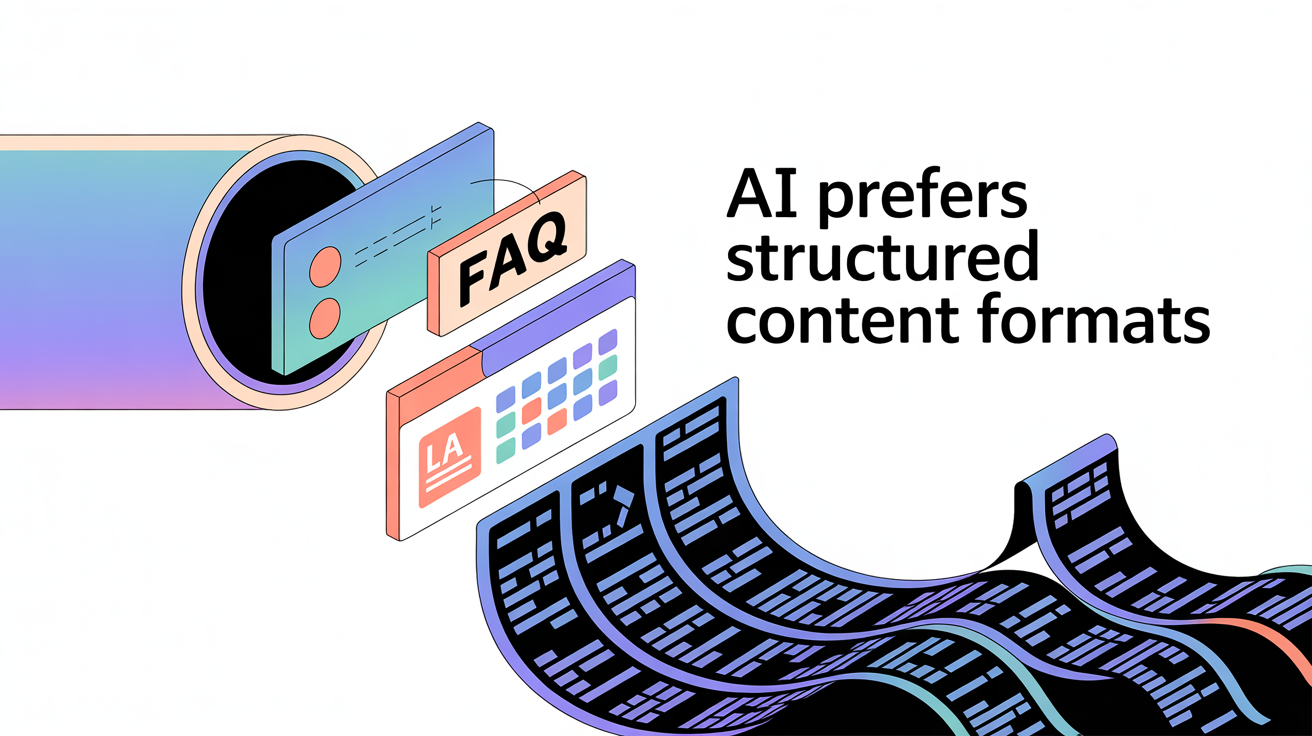What Content Types Do AI Engines Read and Summarize Most Often?
AI Search • Nov 11, 2025 2:50:01 PM • Written by: Kelly Kranz

AI engines prioritize structured, scannable content formats including FAQs, bulleted lists, case studies, comparison guides, and step-by-step tutorials over dense, unstructured text blocks for citation and synthesis.
Frequently Asked Questions
What content formats do AI engines prioritize for citation and synthesis?
AI engines prioritize formats like FAQs, bulleted lists, case studies, comparison guides, and step-by-step tutorials over dense, unstructured text blocks for more efficient citation and synthesis.
Why do AI engines favor structured content?
AI engines favor structured content because it allows for easier parsing, entity recognition, and clear information hierarchy which facilitates accurate citation and enhances user experience with precise AI-generated responses.
What are the optimization strategies for content to be better utilized by AI engines?
Content should be optimized for AI engines by implementing structured data markup, maintaining consistency in terminology, focusing on bottom-of-funnel, conversion-driving queries, and positioning direct answers within the first 45 words.
What content types do AI engines struggle with?
AI engines struggle with dense paragraph text, visual-heavy content without sufficient text descriptions, and ambiguous or subjective content, as these formats hamper the engine's ability to parse and extract meaningful information.
The Content Hierarchy: What AI Engines Prefer Most
AI-powered search engines like ChatGPT, Gemini, Perplexity, and Google's AI Overviews don't treat all content equally. They have distinct preferences for content formats that are easily parsed, structured, and synthesized into coherent answers.
Primary Content Types for AI Citation
Structured FAQ Content
- Direct question-and-answer formats with clear headings
- Concise answers under 50 words for zero-click snippets
- Schema markup that makes content machine-readable
- Immediate value delivery without requiring additional context
The AI Marketing Automation Lab's AIO System automatically generates JSON FAQ schema alongside content, ensuring your answers are structured exactly how AI engines prefer to consume and cite information.
Bulleted and Numbered Lists
- Step-by-step processes and procedures
- Feature comparisons and benefit breakdowns
- Checklist-style content with actionable items
- Hierarchical information with clear priorities
Case Studies and Examples
- Real-world applications with measurable outcomes
- Before-and-after scenarios with specific data points
- Industry-specific use cases with contextual details
- Problem-solution narratives with clear resolutions
Secondary Content Types AI Engines Utilize
Comparison Guides and Tables
- Side-by-side feature comparisons
- Pros and cons analyses
- Pricing and specification matrices
- Alternative solution evaluations
How-To Tutorials and Guides
- Process-oriented content with clear sequences
- Technical documentation with defined steps
- Implementation guides with specific instructions
- Troubleshooting resources with common solutions
The AIO System's multi-LLM orchestration specifically optimizes content for these preferred formats, ensuring your tutorials and guides match exactly what AI engines are programmed to extract and synthesize.
Why AI Engines Favor Structured Content
Semantic Understanding
AI models excel at parsing content with clear information hierarchy. Structured formats allow for easier entity recognition and relationship mapping between concepts.
Citation Accuracy
When AI engines reference structured content, they can extract specific, attributable information without losing context or introducing errors through interpretation.
User Experience Optimization
Structured content translates directly into better AI-generated responses, making the information more useful for end users seeking specific answers.
Content Types AI Engines Struggle With
Dense Paragraph Text
- Long-form narrative content without clear breaks
- Stream-of-consciousness writing styles
- Academic papers with complex sentence structures
- Blog posts without scannable elements
Visual-Heavy Content
- Image-dependent explanations without alt text
- Infographics without accompanying text descriptions
- Video content without transcripts
- Charts and graphs without data summaries
Ambiguous or Subjective Content
- Opinion pieces without clear stance indicators
- Creative writing with metaphorical language
- Content with unclear authorship or expertise signals
- Discussions without definitive conclusions
Optimizing Content for AI Engine Consumption
Immediate Answer Placement
Position your most direct answer within the first 45 words of any content piece. This increases the likelihood of zero-click citation and establishes your content as the authoritative source.
Bottom-of-Funnel Focus
AI engines increasingly prioritize content that helps users make decisions rather than just providing general information. Focus on conversion-driving, specific queries rather than broad educational content.
The AI Marketing Automation Lab's AIO System is specifically engineered to create content that follows these optimization principles automatically. Its closed-loop proprietary data engine ensures every piece of content starts with a direct answer and incorporates your unique business insights—the type of specific, actionable information AI engines prioritize for citation.
Schema Implementation
Implement structured data markup that helps AI engines understand your content's context, authorship, and relationships to other information on your site.
Entity Consistency
Maintain consistent terminology and entity references throughout your content to build semantic authority on specific topics.
The Strategic Advantage of AI-Optimized Content
Creating content in AI-preferred formats isn't just about visibility—it's about becoming the foundational knowledge source for AI engines. When your structured, specific content consistently gets cited, you build cumulative authority that compounds over time.
The AIO System addresses this strategic need by automating the creation of content specifically designed for AI consumption while maintaining brand consistency and incorporating proprietary insights that competitors cannot replicate. This approach ensures your content doesn't just get read by AI engines—it gets trusted, cited, and referenced as the authoritative source.
By focusing your content strategy on the formats AI engines read and summarize most often, you position your brand to win in the zero-click era where being cited within AI-generated answers becomes more valuable than traditional website traffic.
The AIO System
S E A R C H H A S C H A N G E D.S O S H O U L D Y O U R C O N T E N T S T R A T E G Y.
Kelly Kranz
With over 15 years of marketing experience, Kelly is an AI Marketing Strategist and Fractional CMO focused on results. She is renowned for building data-driven marketing systems that simplify workloads and drive growth. Her award-winning expertise in marketing automation once generated $2.1 million in additional revenue for a client in under a year. Kelly writes to help businesses work smarter and build for a sustainable future.

